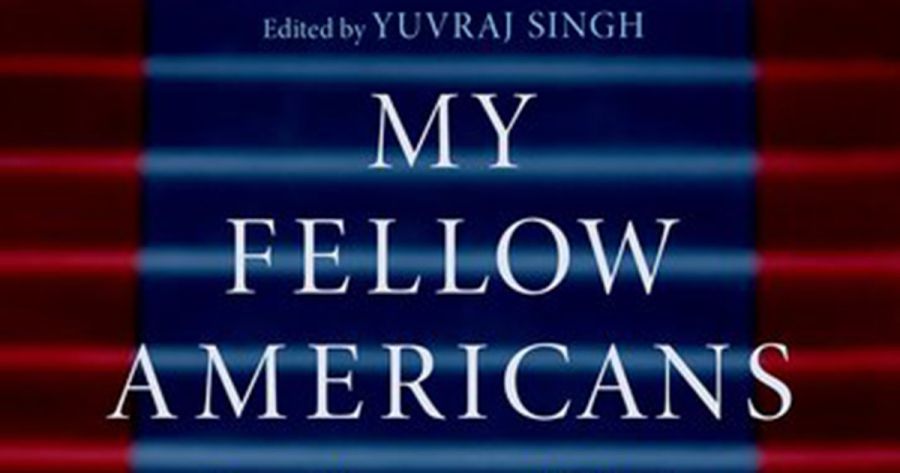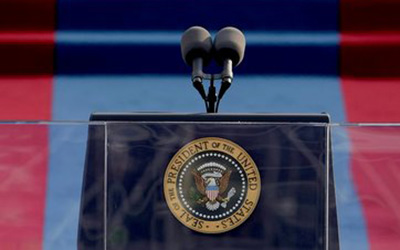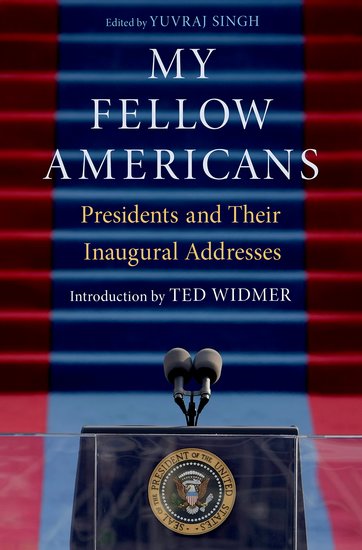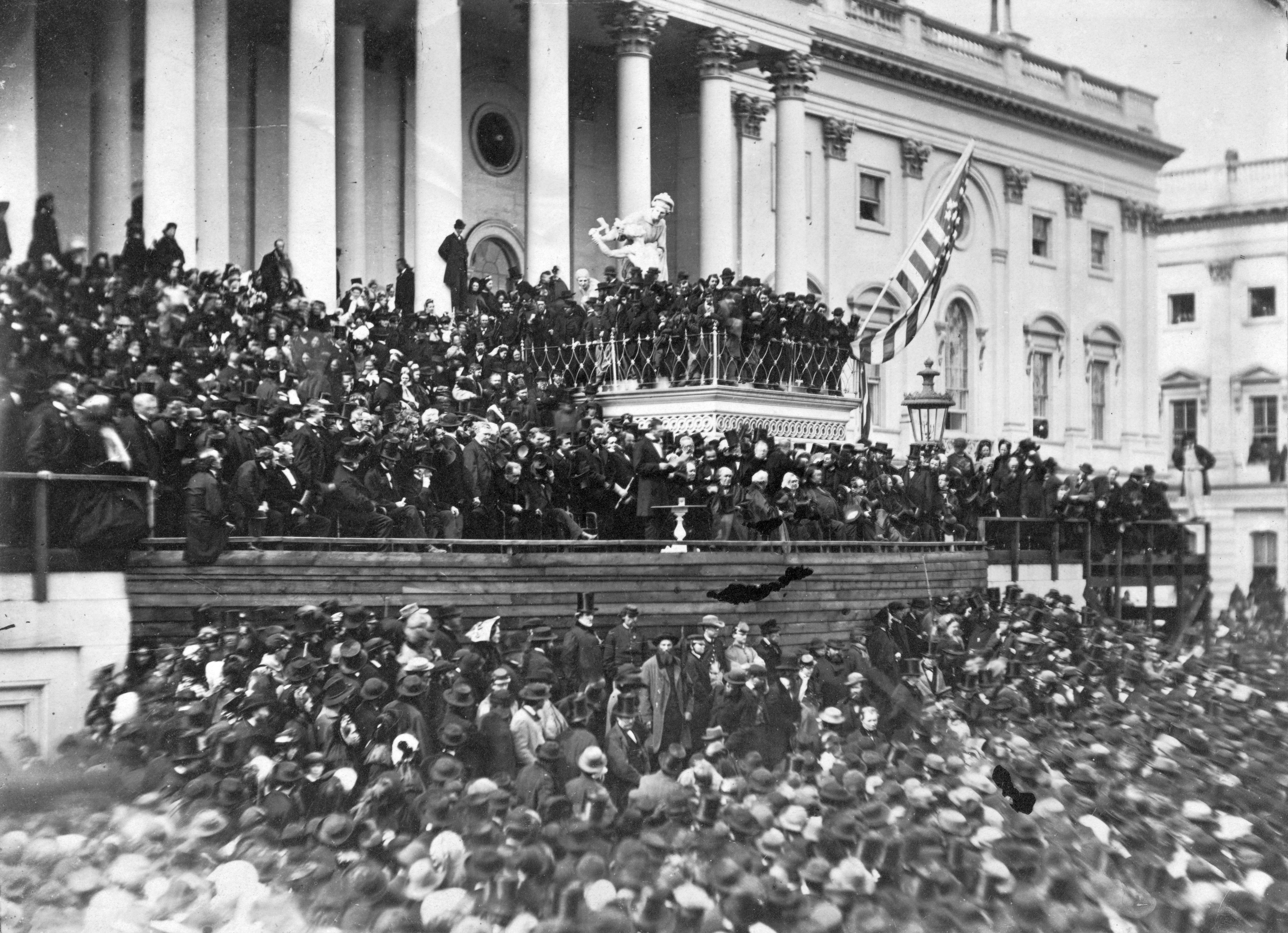
- Free Article: No
- Contents Category: Speeches
- Review Article: Yes
- Article Title: A nation’s wounds
- Article Subtitle: Presidential rhetoric and politics
- Online Only: No
- Custom Highlight Text:
The inaugural addresses of presidents of the United States have inspired and comforted, set new national directions, and defined not only presidents but entire eras of American history. Franklin D. Roosevelt’s assurance ‘that the only thing we have to fear is fear itself’ gave hope to an America suffering through the Great Depression and signalled the beginning of the modern American welfare state. John F. Kennedy embodied a youthful American idealism and challenged a new generation of Americans during the Cold War: ‘Ask not what your country can do for you, ask what you can do for your country.’ Ronald Reagan set a different ideological course for the nation with his diagnosis that ‘government is not the solution to our problem; government is the problem’.
- Featured Image (400px * 250px):

- Alt Tag (Featured Image): Varun Ghosh reviews ‘My Fellow Americans: Presidents and their inaugural addresses’ edited by Yuvraj Singh
- Book 1 Title: My Fellow Americans
- Book 1 Subtitle: Presidents and their inaugural addresses
- Book 1 Biblio: Oxford University Press, £26.99 hb, 649 pp
- Book 1 Cover Small (400 x 600):

- Book 1 Cover (800 x 1200):

- Book 1 Readings Link: https://www.readings.com.au/product/9780197644997/my-fellow-americans--2023--9780197644997#rac:jokjjzr6ly9m
Given the historical significance of these speeches, it is perhaps surprising that inaugural addresses (unlike the president’s annual State of the Union address to Congress) are not required by the US constitution. The practice arose because America’s first president, George Washington, spontaneously decided to make a statement after he took the oath of office for the first time. Every president since has followed his example.
In My Fellow Americans, editor Yuvraj Singh has assembled the sixty-four presidential inaugural addresses (or addresses on taking office) from 1789 to 2021. Accompanying the speeches are essays from historians that seek to put the words of the presidents in their historical context.
 Abraham Lincoln’s second inaugural address, Washington DC, 1865 (Alexander Gardner via Wikimedia Commons)
Abraham Lincoln’s second inaugural address, Washington DC, 1865 (Alexander Gardner via Wikimedia Commons)
At nearly 650 pages, it is a substantial tome and showcases the variety of different presidential approaches. Many presidents have expounded the virtue of the American system of government. Some have sought to catalogue policy proposals. Others addressed the primary or essential concern of the moment. The speeches vary in length considerably. George Washington’s second inaugural in 1793 was the shortest, at fewer than 150 words. William Henry Harrison’s inaugural of 1841, delivered in the bitter cold of Washington DC, was just short of 8,500 words. (The sixty-eight-year-old Harrison caught pneumonia and died thirty days after the occasion.)
Collectively, the speeches constitute a fascinating historical trove. Although each address provides a snapshot of a point in time, together they illustrate the remarkable evolution of the American nation from fragile young republic to global superpower. The United States in picture grows from thirteen states to fifty, and transitions from being a predominantly agricultural economy to a manufacturing and then technological powerhouse.
Despite these monumental changes, many themes and issues recur as matters of presidential concern: America’s role and responsibility in the world; the optimal level of tariff protection; approaches to immigration; and the proper role and scope of government in the economy and in society. These remain contested to this day. Also notable is the extent to which the issue of slavery vexed the American republic. Debates about the maintenance, the abolition, and aftermath of this heinous institution are woven through the inaugurals of the nineteenth century and beyond.
While insights and inferences may be drawn from this extensive collection, traversing American history through the prism of presidential inaugurals does offer uneven and often unreliable perspectives. The speeches are inherently political in nature. Delivered once every four years, there are gaps in the narrative. Some addresses are made almost immediately irrelevant by subsequent events. For example, the agenda that George W. Bush set out in his inaugural in January 2001 was almost entirely sidelined by the terrorist attacks on the United States on September 11 that year and the subsequent wars in Afghanistan and Iraq, which became the focus of his presidency.
The essays that accompany the inaugural addresses in My Fellow Americans go some way to address these deficiencies. However, these essays are brief and often vary in subject and focus. While useful aides to understanding the speeches, but they do not offer substantive history.
A comprehensive collection of presidential speeches inevitably invites comparison. These addresses are rhetorical artefacts. Alongside the iconic and memorable, there are the prosaic, tedious, and forgettable. The speeches that stand out in this collection are delivered by presidents who faced the momentous challenges in American history: Lincoln and the Civil War, Roosevelt and the Great Depression, Reagan and the Cold War.
The alchemy of language is also important. While the historical significance of the election of Kennedy, the first Catholic president, and Obama, the first African-American president, ensured their places in history, it is the style and fluency of their language that make their inaugural addresses memorable additions to the canon.
In a collection with many important speeches, Lincoln’s second inaugural address shines most brightly. Delivered in 1865, as the American Civil War was drawing towards a close, Lincoln marshalled words and logic to matchless eloquence in the cause of the Union:
Both parties deprecated war, but one of them would make war rather than let the nation survive, and the other would accept war rather than let it perish, and the war came … Both read the same Bible and pray to the same God, and each invokes His aid against the other. It may seem strange that any men should dare to ask a just God’s assistance in wringing their bread from the sweat of other men’s faces, but let us judge not, that we be not judged.
In his closing passage, Lincoln states:
With malice toward none, with charity for all, with firmness in the right as God gives us to see the right, let us strive on to finish the work we are in, to bind up the nation’s wounds, to care for him who shall have borne the battle and for his widow and his orphan, to do all which may achieve and cherish a just and lasting peace among ourselves and with all nations.
Brief yet encompassing, grave yet optimistic, balanced yet persuasive, Lincoln’s second inaugural is rightly celebrated and is worth savouring.
My Fellow Americans will not appeal to everyone but as an attractive and occasionally useful reference work, well suited to a political pundit’s bookshelf, it yields rewarding insights into American politics and rhetoric and offers absorbing perspectives on American history.


Comments powered by CComment